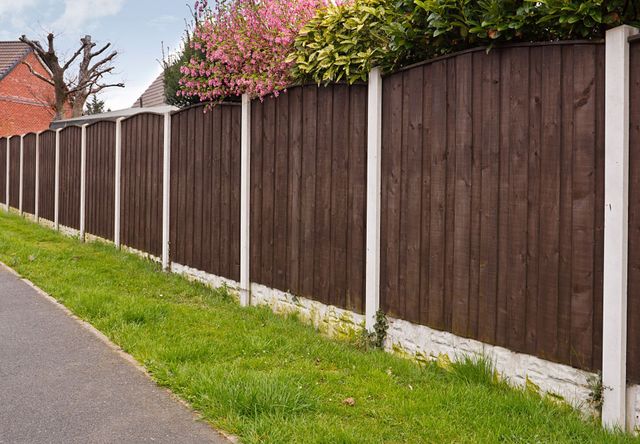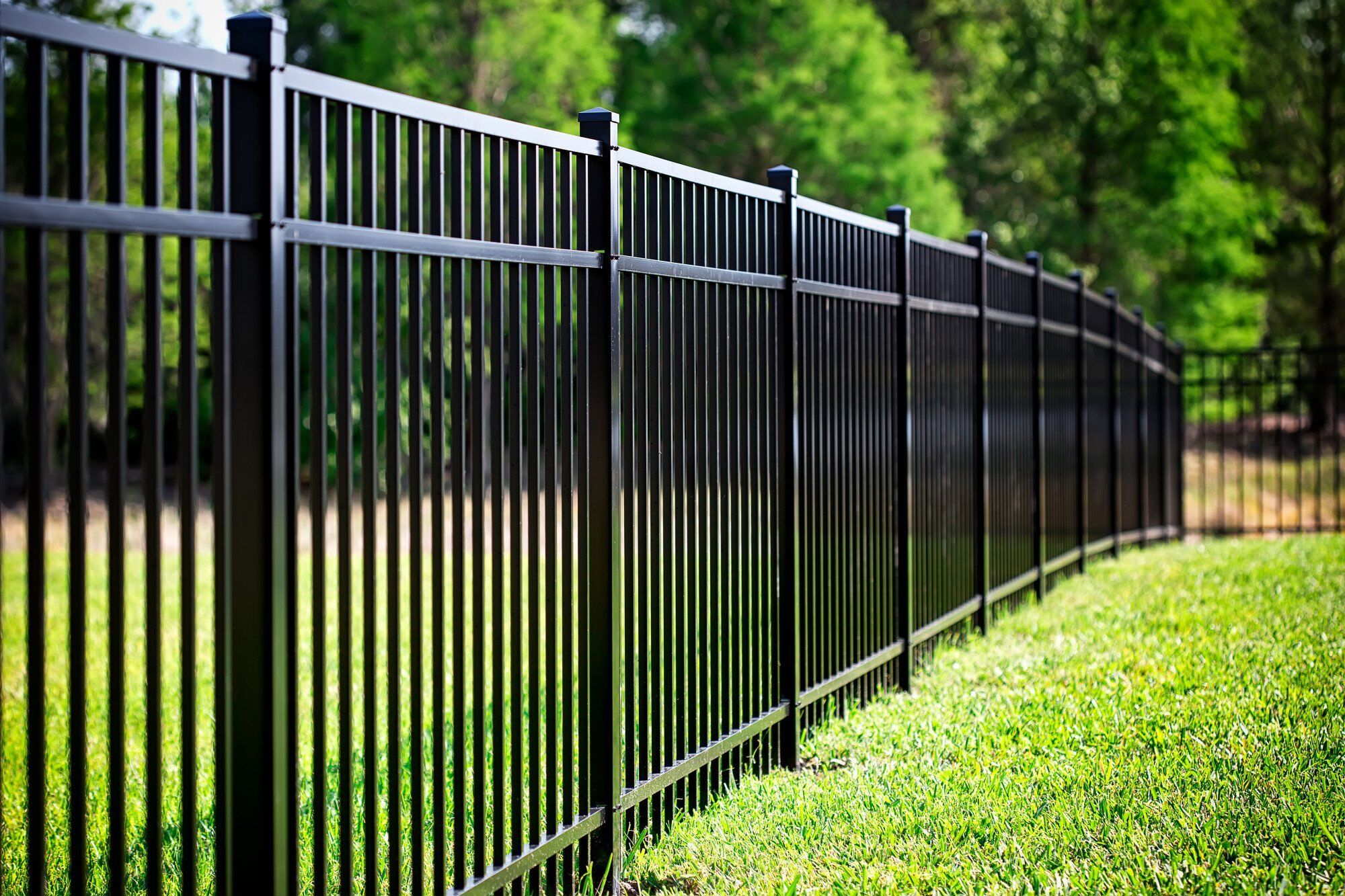All Categories
Featured
Choosing the appropriate kind of fence for your property is a decision that requires thoughtful factor to consider of a number of aspects, from the product and style to its purpose and upkeep demands. A fence not just offers functional functions such as safety and privacy yet can likewise enhance the aesthetic charm of your home. With a range of products readily available, it's important to understand what works best for your specific demands.
![]()
Privacy: If your objective is to shut out the view from passersby or next-door neighbors, you'll want a strong fencing without spaces. Materials like plastic, wood, and compound are preferred choices for privacy fencings. They supply the required coverage to make certain a remote yard or garden area. Protection: For keeping trespassers out or safeguarding kids and pets, you'll require a strong, high fence. Metal fencings such as aluminum, chain, or steel link deal great resilience and are tough to climb. These materials are additionally excellent for developing a protected perimeter around your residential property. Aesthetic Charm: If the objective of your fence is much more ornamental than practical, you might select a picket fencing, functioned iron, or a split rail fence. These options give an eye-catching border without supplying full personal privacy. 2. Consider Your Budget plan. Your budget will certainly play a crucial function in your choice. Various materials featured differing price points, so it is very important to think about just how much you want to spend. Below are some basic guidelines:
Timber Fencing: Among the most cost-efficient alternatives, timber fences can be personalized and set up conveniently, though they require upkeep to avoid rot and bending. Routine staining or painting is essential to preserve its look and sturdiness. Vinyl Fence: While plastic is more pricey upfront than timber, it's a low-maintenance option. Plastic fencings don't need painting, staining, or securing, and they are resistant to degeneration, fading, and insects. Nevertheless, they can be vulnerable to breaking in extreme cool temperature levels. Chain Web Link Fencing: If your major priority is keeping expenses low, chain web link fencings are one of the most economical alternative. While they don't provide much in regards to privacy, they're practical for securing family pets and noting property limits. Steel Secure Fencing (Light Weight Aluminum or Steel): Metal fences are durable, lasting, and practically maintenance-free. While they can be costlier than timber or chain web link, they offer included security and a smooth, modern-day look. 3. Toughness and Upkeep Requirements. Believe about the long-term resilience of your fence and just how much effort and time you want to purchase maintenance:
![]()
Timber: While wood offers a natural look, it calls for routine upkeep, consisting of discoloring and securing, to protect it from the aspects. Timber fences can last 10-15 years with correct upkeep. Vinyl: Plastic fences are low-maintenance and are very long lasting. They will not rot, warp, or discolor over time. Once set up, you can expect a vinyl fence to last for several decades with marginal treatment. Metal: Light weight aluminum and steel fencings are extremely resilient and require little to no upkeep. Light weight aluminum won't rust, and steel can be treated with a protective finishing to stop rust. Both choices can withstand extreme climate condition and are excellent for long-term use. Chain Web link: Although wire mesh fence are sturdy and resilient, they might require periodic repair work, specifically if the galvanized finishing starts to put on off. They can corrosion with time, though modern finishes like vinyl are offered to extend the lifespan. 4. Element in Aesthetic Allure. The design and layout of the fencing need to match the architecture of your building. Think about the general aesthetic you intend to achieve:
Standard Homes: For even more traditional, standard residential or commercial properties, a timber or wrought iron fencing could be the most effective fit. These products use a timeless charm and can be tailored to match the style of your home. Modern or Contemporary Homes: If you have a modern home, you might want to pick smooth, minimalistic products like light weight aluminum or plastic. These fences give a tidy look and can be personalized with different colors or coatings. Farm or Country Settings: For larger residential or commercial properties or country setups, split-rail or ranch-style fences can provide a genuine look and appropriate for defining home boundaries while still enabling for an open view. 5. Climate Considerations. The environment in your area plays a vital duty in figuring out the most effective material for your fencing. If you stay in an area with high humidity or heavy rainfall, wood might warp or rot unless treated appropriately. Plastic and steel choices, nonetheless, execute well in a lot of environments and are much less susceptible to damages brought on by wetness.
![]()
Conclusion. Picking the appropriate fencing for your residential property depends on comprehending your requirements, spending plan, and individual choices. Whether you're prioritizing personal privacy, safety, looks, or reduced maintenance, there is a wide variety of alternatives offered. By taking into consideration the material, toughness, and design of your fencing, you can make sure that it enhances the feature and look of your home for several years to find.

- Assess the Purpose of the Fencing. The initial step in choosing the suitable fencing is recognizing its primary feature. The kind of fence you select will certainly depend upon what you wish to achieve:
Privacy: If your objective is to shut out the view from passersby or next-door neighbors, you'll want a strong fencing without spaces. Materials like plastic, wood, and compound are preferred choices for privacy fencings. They supply the required coverage to make certain a remote yard or garden area. Protection: For keeping trespassers out or safeguarding kids and pets, you'll require a strong, high fence. Metal fencings such as aluminum, chain, or steel link deal great resilience and are tough to climb. These materials are additionally excellent for developing a protected perimeter around your residential property. Aesthetic Charm: If the objective of your fence is much more ornamental than practical, you might select a picket fencing, functioned iron, or a split rail fence. These options give an eye-catching border without supplying full personal privacy. 2. Consider Your Budget plan. Your budget will certainly play a crucial function in your choice. Various materials featured differing price points, so it is very important to think about just how much you want to spend. Below are some basic guidelines:
Timber Fencing: Among the most cost-efficient alternatives, timber fences can be personalized and set up conveniently, though they require upkeep to avoid rot and bending. Routine staining or painting is essential to preserve its look and sturdiness. Vinyl Fence: While plastic is more pricey upfront than timber, it's a low-maintenance option. Plastic fencings don't need painting, staining, or securing, and they are resistant to degeneration, fading, and insects. Nevertheless, they can be vulnerable to breaking in extreme cool temperature levels. Chain Web Link Fencing: If your major priority is keeping expenses low, chain web link fencings are one of the most economical alternative. While they don't provide much in regards to privacy, they're practical for securing family pets and noting property limits. Steel Secure Fencing (Light Weight Aluminum or Steel): Metal fences are durable, lasting, and practically maintenance-free. While they can be costlier than timber or chain web link, they offer included security and a smooth, modern-day look. 3. Toughness and Upkeep Requirements. Believe about the long-term resilience of your fence and just how much effort and time you want to purchase maintenance:

Timber: While wood offers a natural look, it calls for routine upkeep, consisting of discoloring and securing, to protect it from the aspects. Timber fences can last 10-15 years with correct upkeep. Vinyl: Plastic fences are low-maintenance and are very long lasting. They will not rot, warp, or discolor over time. Once set up, you can expect a vinyl fence to last for several decades with marginal treatment. Metal: Light weight aluminum and steel fencings are extremely resilient and require little to no upkeep. Light weight aluminum won't rust, and steel can be treated with a protective finishing to stop rust. Both choices can withstand extreme climate condition and are excellent for long-term use. Chain Web link: Although wire mesh fence are sturdy and resilient, they might require periodic repair work, specifically if the galvanized finishing starts to put on off. They can corrosion with time, though modern finishes like vinyl are offered to extend the lifespan. 4. Element in Aesthetic Allure. The design and layout of the fencing need to match the architecture of your building. Think about the general aesthetic you intend to achieve:
Standard Homes: For even more traditional, standard residential or commercial properties, a timber or wrought iron fencing could be the most effective fit. These products use a timeless charm and can be tailored to match the style of your home. Modern or Contemporary Homes: If you have a modern home, you might want to pick smooth, minimalistic products like light weight aluminum or plastic. These fences give a tidy look and can be personalized with different colors or coatings. Farm or Country Settings: For larger residential or commercial properties or country setups, split-rail or ranch-style fences can provide a genuine look and appropriate for defining home boundaries while still enabling for an open view. 5. Climate Considerations. The environment in your area plays a vital duty in figuring out the most effective material for your fencing. If you stay in an area with high humidity or heavy rainfall, wood might warp or rot unless treated appropriately. Plastic and steel choices, nonetheless, execute well in a lot of environments and are much less susceptible to damages brought on by wetness.

- Neighborhood Regulations and HOA Standards. Before completing your fence choice, see to it to contact your neighborhood district or property owners association (HOA) for any kind of limitations regarding fencing elevation, products, or design. Several locations have specific guidelines in area, and it is very important to abide to stay clear of possible fines or having to take apart the fence.
Conclusion. Picking the appropriate fencing for your residential property depends on comprehending your requirements, spending plan, and individual choices. Whether you're prioritizing personal privacy, safety, looks, or reduced maintenance, there is a wide variety of alternatives offered. By taking into consideration the material, toughness, and design of your fencing, you can make sure that it enhances the feature and look of your home for several years to find.
Latest Posts
A Newbie's Overview to Recognizing Your Vehicle's Inspect Engine Light
Published Dec 19, 24
0 min read
Axle Repair Services: Guaranteeing Smooth and Safe Trips
Published Dec 19, 24
1 min read
Why Normal Oil Modifications Are Essential for Your Engine's Health
Published Dec 19, 24
0 min read
More
Latest Posts
A Newbie's Overview to Recognizing Your Vehicle's Inspect Engine Light
Published Dec 19, 24
0 min read
Axle Repair Services: Guaranteeing Smooth and Safe Trips
Published Dec 19, 24
1 min read
Why Normal Oil Modifications Are Essential for Your Engine's Health
Published Dec 19, 24
0 min read